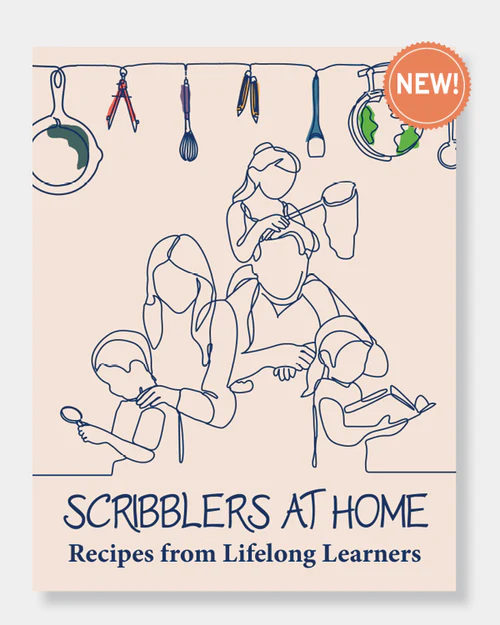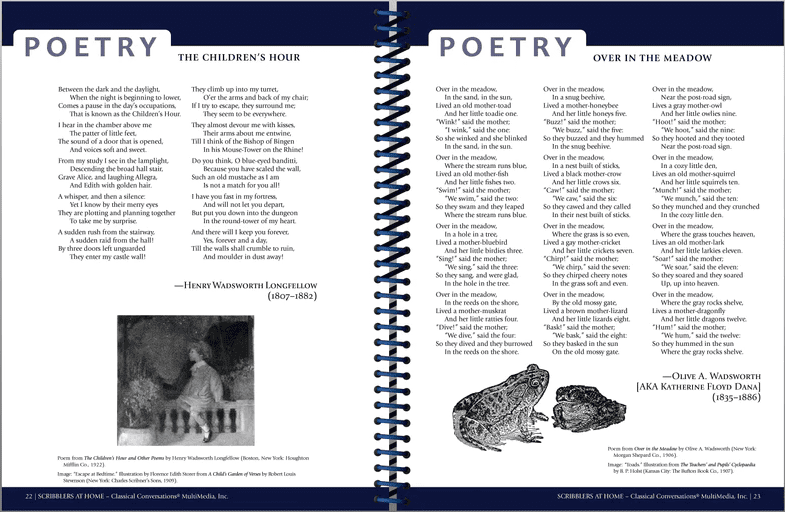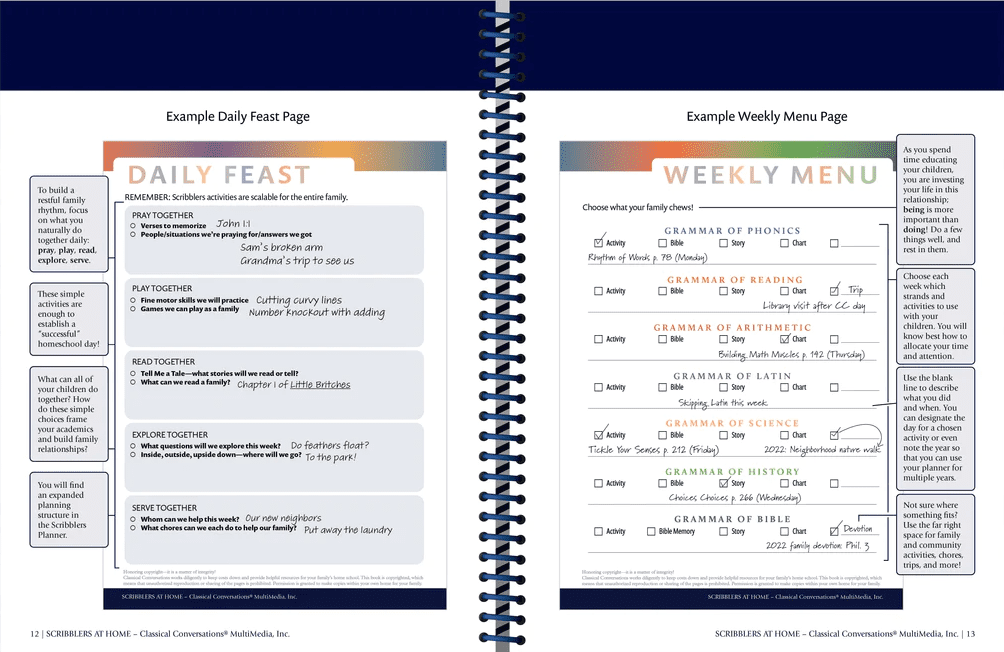Finding the best preschool homeschool curriculum for your child is like planning the perfect meal. You want a recipe for success that you and your preschooler can savor along the way.
Parents often want to jump-start their child’s education by implementing a rigorous homeschool schedule, but the preschool years are best spent playing to develop a sense of wonder and love of learning.
We understand that choosing the right pre-K homeschool curriculum can be daunting. This resource will show you how to homeschool your preschool children and lay the foundation for future learning.
Scribblers At Home offers an all-in-one guide that is quick and easy to use. This grab-and-go resource provides 5 to 10-minute activities that will engage little learners, expand their knowledge, and deepen their understanding of the world around them.
Let’s take a look at how to homeschool preschool children, what makes the best homeschool preschool curriculum, and helpful resources for new preschool homeschool parents.
How to Homeschool Preschool
Preschoolers are naturally curious and are inclined to imitate others. The classical model of education builds on a child’s inquisitive nature by learning in layers. Introducing rich vocabulary, channeling curiosity through dialogue, and providing problem-solving opportunities prepare preschoolers for a lifetime of learning.
As a parent, you must ask yourself: “What do I want my children to know?” Your first thought might be Reading, Writing, and ‘Rithmetic, but consider a perspective shift toward a celebration of learning. Preschool is a time to enjoy exploring the simple wonders of life together.
The foundation of learning how to learn is set in the Five Core Habits of Grammar:
- Naming
- Attending
- Memorizing
- Expressing
- Storytelling
Using these core habits as the structure for your preschool homeschool curriculum cultivates valuable conversations that lead to new skills, interests, and ideas.
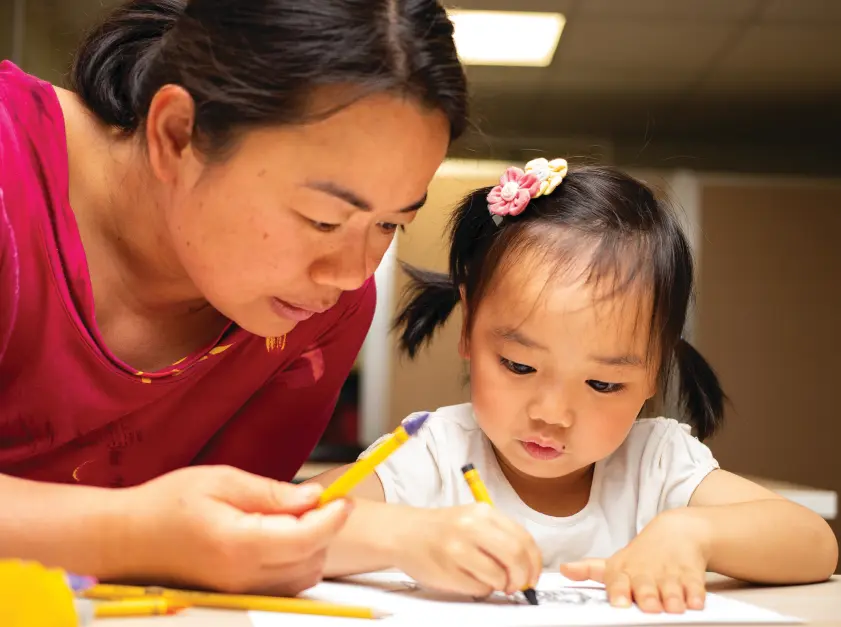
Best Homeschool Preschool Curriculum
Scribblers at Home: Recipes from Lifelong Learners is the premier classical Christian resource for homeschooling families looking for a learning blueprint for children ages 4–8. This resource offers 250 pages+ of activities that foster a love of learning through play, exploration, and reading.
Parents are introduced to the idea that play is the work of childhood and that playing with intention builds the skills of learning we all want our children to acquire. The charts allow parents to reclaim their own education and show what the emphasized skill will lead to in later learning when students are twelve to eighteen or eighty-one!
Scribblers At Home offers eight learning strands (subjects) with simple activities for little learners. Activities in phonics, exposition, arithmetic, Latin, science, history, and the Bible are included, as well as a poetry memorization section. Read on to learn more about the benefits of each.
Poetry
Poetry allows us to discover new worlds and develop empathy while tickling our ears with beautiful words. Family poetry reading time creates special shared memories together.
Riddles, nursery rhymes, and nature poems are just three types of poems that students and parents feast on to develop an appreciation for different types of writing styles.
This restful bonding time in the early years creates poets in your preschoolers. How? A 3-year-old’s love for repetition leads to a 4-year-old’s memorizing and reciting delightful poetry. Copying and coloring excellent poetry trains a 5-year-old in fine motor skills and penmanship, launching them toward constructing their own beautiful poems in the future.
Phonics
A reading program should be part of a homeschool curriculum for preschoolers. Scribblers At Home uses the classical approach of phonics to teach students to memorize sounds associated with letters. These sounds combine into syllables, which build into words.
Phonics mastery at home can be fun, not fearful, as new readers develop an ear for sound combinations through play, song, and games.
Literature
Practicing phonics and reading skills using excellent content is the key to unlocking the delights of every other subject. Engaging with great literature builds critical thinking, cultivates imagination, and forms character.
Snuggling up with a good book to read aloud to your preschooler promotes family bonds and fosters an excitement to explore different cultures, times, places, and ideas.
“Reading as a family allows children to build a rich, expansive vocabulary as they fall in love with stories.” -Leigh Bortins, The Core (106)
You can view the Scribblers book list for great literature here:
Scribblers at Home Book List
Arithmetic
Playing with numbers is the first step in learning the language of math. A preschool curriculum uses play to help early learners grasp numbers, operations, laws, shapes, patterns, measurements, and place values.
Whether it’s counting Cherrios at the kitchen table or sorting buttons into groups, the Scribblers preschool math curriculum prepares students to solve daily issues and think conceptually about the world.
Latin
Should busy toddlers and pre-k students learn Latin? Yes! Preschoolers are eager to memorize and store up copious amounts of information, which makes the preschool years the perfect time to begin language studies.
Students who learn Latin understand their own language better and excel at learning foreign languages. Latin words and stories provide context for our current culture and for classical literature.
Using hands-on activities and kinesthetic movements for Latin study helps preschoolers connect neural pathways early on for a lifetime of language benefits.
Science
Teaching preschoolers the skills of observation and inquiry can happen in your own backyard. These skills equip children to appreciate the beauty and harmony of the world around them.
Scribblers At Home offers families bite-sized lesson plans to engage preschoolers in a variety of subject areas, including physics, chemistry, and biology. Hands-on activities for your little learners teach each child to “think like a scientist.”
History
Having preschool at home is a great way to introduce complex concepts in age-appropriate ways. History is a great example of this tailoring technique for preschool.
With Scribblers At Home, families practice memorizing historical facts, drawing maps, and public speaking using materials around the house for fun, interactive experiences.
Bible
Scribblers At Home provides families with a classical Christian homeschool education. This homeschool curriculum for preschool is part of Classical Conversations, which provides a homeschool model for education through high school and beyond.
Compared to secular preschool homeschool curriculums, which compartmentalize subjects of learning, Scribblers At Home connects all learning strands together and ultimately points all knowledge back to God.
Specialized Bible reading guides allow families to dive into the Word together. Creating a Scripture reading and prayer time produces profound impacts in our littlest learners.
“To challenge our reading abilities, we read and discuss the Bible every morning…the discussion leads us to many different subjects.” -Leigh Bortins, The Core (104)
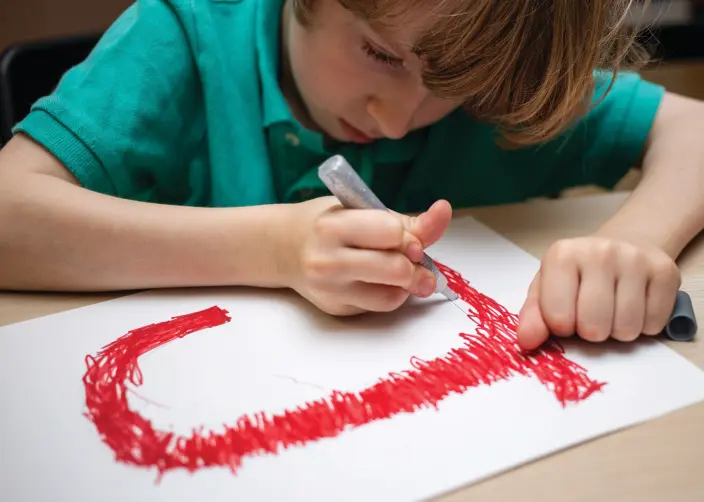
Planning Your Curriculum for Preschool
The preschool years are not meant to be filled with programs and structured activities all the time. These years are fleeting and meant to be filled with play and snuggles and reading and wonder.
Families can set their own pace. Your family may use the 108 activities and charts in Scribblers At Home as often as you like. Furthermore, you can use the book for multiple years with several children.
Weekly and daily planner sheets are included in the Scribblers At Home curriculum. Parents are encouraged to choose a few options from the list of subjects to plug in during the week. Being present with your preschooler is more important than doing all the things.
The daily planner focuses on a restful family rhythm of “pray, play, read, explore, and serve.” Having fun together is most important for building a lifelong love of learning in your students.
Other Resources for Your Classical Preschool Homeschool Curriculum
The Core: Teaching Your Child the Foundations of Classical Education
This book, written by Classical Conversations founder Leigh Bortins, explains the whys and the hows of classical Christian homeschooling.
Phonics-based readers and curated collections of science, history, and traditional stories designed as read-alouds for the littlest learners.
Practice cursive and handwriting skills
Ten Ways to Destroy the Imagination of Your Child
A witty look at the importance of play and imagination in early childhood.
This text will be offset to the left.
Focus on the Future of Your Homeschool
Homeschooling your child beyond preschool is a big step. You don’t have to do it alone! With Classical Conversations, you are connected to a local community of fellow families, all walking the homeschool journey together beginning when your student is four years old.
Frequently Asked Questions
What is a good age to start preschool?
Typically, preschool begins at age 3-4, but learning begins at birth with a child’s first and best teacher, his parents. Children develop an interest in sounds and letters around age 3, so homeschooling parents can start pursuing more focused learning time as their children’s interests develop.
How do I make a good homeschool preschool schedule?
A good homeschool preschool schedule should be restful and fit into your family’s rhythm of life. Important daily routines can include:
- Reading together: snuggles and stories
- Free play: unstructured activities
- Exploration: field trips, nature walks
- Serving: helping others or helping around the house
- Prayer: strengthen your family’s faith and bonds together
What is the best teaching method for preschool?
The classical method of education follows the natural progression of students’ learning. Play-based learning is highly effective for preschool-aged children, as they enjoy soaking up information while using imagination and movement.
The Right Homeschool Preschool Curriculum: Scribblers At Home
Educating your child is a feast to be enjoyed together. Scribblers At Home serves up bountiful options to fill your banquet table with delicious learning opportunities.
Classical Conversations believes you are the best teacher for your child, and we’re eager to support your homeschool journey. In a sea of other homeschool curriculum options, Scribblers At Home provides a classical, Christian homeschool curriculum that engages the whole family in learning together.
Find out what others are saying about Scribblers At Home, or click below to purchase your curriculum to start the celebration of learning.


